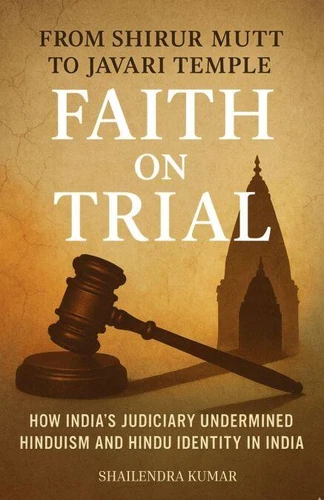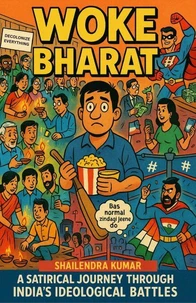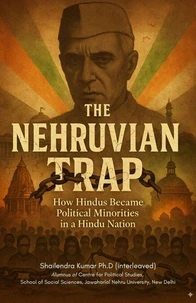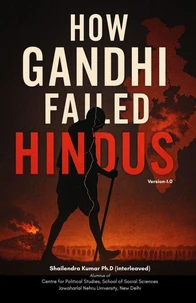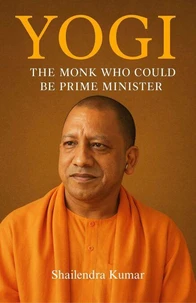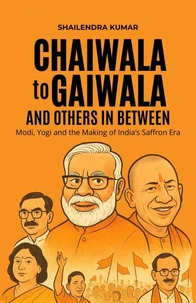From Shirur Mutt to Javari Temple - FAITH ON TRIAL: How India’s Judiciary Undermined Hinduism and Hindu Identity in India
Par :Nouveauté
Formats :
Disponible dans votre compte client Decitre ou Furet du Nord dès validation de votre commande. Le format ePub est :
- Compatible avec une lecture sur My Vivlio (smartphone, tablette, ordinateur)
- Compatible avec une lecture sur liseuses Vivlio
- Pour les liseuses autres que Vivlio, vous devez utiliser le logiciel Adobe Digital Edition. Non compatible avec la lecture sur les liseuses Kindle, Remarkable et Sony
 , qui est-ce ?
, qui est-ce ?Notre partenaire de plateforme de lecture numérique où vous retrouverez l'ensemble de vos ebooks gratuitement
Pour en savoir plus sur nos ebooks, consultez notre aide en ligne ici
- FormatePub
- ISBN8231588039
- EAN9798231588039
- Date de parution24/09/2025
- Protection num.pas de protection
- Infos supplémentairesepub
- ÉditeurWalzone Press
Résumé
From Shirur Mutt to Javari Temple - FAITH ON TRIAL: How India's Judiciary Undermined Hinduism and Hindu Identity in IndiaFor over seventy years, India's judiciary has claimed the role of interpreter of faith. In landmark judgments - from the Shirur Mutt case of 1954 to the recent Javari Temple verdict - the courts have not merely applied the law, but redefined Hinduism itself. This book is a bold examination of how the doctrine of "essential religious practices" has allowed judges to decide what is Hindu, what is essential, and what can be discarded.
From state control of temples to restrictions on festivals, from priestly rights to questions of worship, judicial rulings have steadily chipped away at Hindu autonomy. While minority religions enjoy the freedom to govern their places of worship, Hindu temples have been turned into instruments of state power and their traditions reshaped by courtroom diktats. The result is not justice, but a systemic undermining of Hindu identity in its own homeland.
From Shirur Mutt to Javari Temple - FAITH ON TRIAL is more than a legal analysis - it is a civilizational narrative. Drawing from constitutional debates, landmark cases, and contemporary controversies, it reveals how India's judiciary, in the name of secularism, has entrenched a deep imbalance that threatens the very ethos of pluralism. At once historical and urgent, scholarly yet accessible, this book challenges readers to confront a critical question: Who should define Hinduism - the faithful or the courts?
From state control of temples to restrictions on festivals, from priestly rights to questions of worship, judicial rulings have steadily chipped away at Hindu autonomy. While minority religions enjoy the freedom to govern their places of worship, Hindu temples have been turned into instruments of state power and their traditions reshaped by courtroom diktats. The result is not justice, but a systemic undermining of Hindu identity in its own homeland.
From Shirur Mutt to Javari Temple - FAITH ON TRIAL is more than a legal analysis - it is a civilizational narrative. Drawing from constitutional debates, landmark cases, and contemporary controversies, it reveals how India's judiciary, in the name of secularism, has entrenched a deep imbalance that threatens the very ethos of pluralism. At once historical and urgent, scholarly yet accessible, this book challenges readers to confront a critical question: Who should define Hinduism - the faithful or the courts?
From Shirur Mutt to Javari Temple - FAITH ON TRIAL: How India's Judiciary Undermined Hinduism and Hindu Identity in IndiaFor over seventy years, India's judiciary has claimed the role of interpreter of faith. In landmark judgments - from the Shirur Mutt case of 1954 to the recent Javari Temple verdict - the courts have not merely applied the law, but redefined Hinduism itself. This book is a bold examination of how the doctrine of "essential religious practices" has allowed judges to decide what is Hindu, what is essential, and what can be discarded.
From state control of temples to restrictions on festivals, from priestly rights to questions of worship, judicial rulings have steadily chipped away at Hindu autonomy. While minority religions enjoy the freedom to govern their places of worship, Hindu temples have been turned into instruments of state power and their traditions reshaped by courtroom diktats. The result is not justice, but a systemic undermining of Hindu identity in its own homeland.
From Shirur Mutt to Javari Temple - FAITH ON TRIAL is more than a legal analysis - it is a civilizational narrative. Drawing from constitutional debates, landmark cases, and contemporary controversies, it reveals how India's judiciary, in the name of secularism, has entrenched a deep imbalance that threatens the very ethos of pluralism. At once historical and urgent, scholarly yet accessible, this book challenges readers to confront a critical question: Who should define Hinduism - the faithful or the courts?
From state control of temples to restrictions on festivals, from priestly rights to questions of worship, judicial rulings have steadily chipped away at Hindu autonomy. While minority religions enjoy the freedom to govern their places of worship, Hindu temples have been turned into instruments of state power and their traditions reshaped by courtroom diktats. The result is not justice, but a systemic undermining of Hindu identity in its own homeland.
From Shirur Mutt to Javari Temple - FAITH ON TRIAL is more than a legal analysis - it is a civilizational narrative. Drawing from constitutional debates, landmark cases, and contemporary controversies, it reveals how India's judiciary, in the name of secularism, has entrenched a deep imbalance that threatens the very ethos of pluralism. At once historical and urgent, scholarly yet accessible, this book challenges readers to confront a critical question: Who should define Hinduism - the faithful or the courts?

